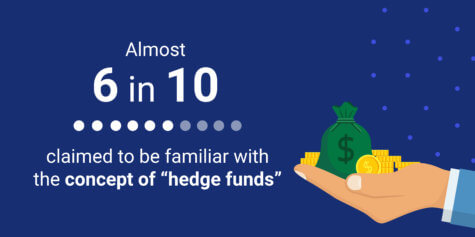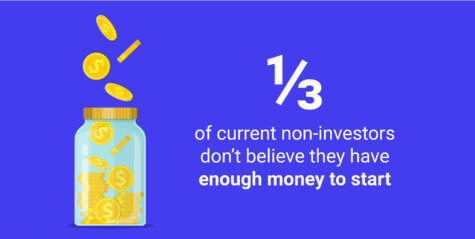-
New survey reveals nearly 3 in 5 people earning less than $60,000 have never invested in their life.
-
1 in 3 non-investors don’t believe they have enough money to start even if they wanted to
NEW YORK — Nearly eight in 10 Americans feel confident in their investing knowledge, but a new survey suggests they still have a lot to learn.
A poll of 2,001 U.S. residents found that while people’s confidence in investing differed based on their household income, many had the same knowledge gaps regardless of their earnings. Eighty-two percent of those with an annual income over $150,000 felt certain of their investing smarts, compared to only 34 percent of those making under $30,000.
Those same high-income respondents are also much more likely to express confidence in making investment decisions than the lowest-income Americans (76% vs. 31%).
However, eight in 10 respondents drew a blank when asked to explain what a “bond” is — and while nearly six in 10 claimed to be familiar with the concept of “hedge funds,” seven in 10 couldn’t match it with the actual definition.
Is investing still a game only for the rich?
Commissioned by CARL and conducted by OnePoll, the survey also found that a third of current non-investors don’t believe they have enough money to start. More than half think they need to earn at least $60,000 a year to begin investing in non-traditional assets such as hedge funds.
That may be why 57 percent of people earning less than $60,000 have never invested, compared to only 18 percent of those making at least $90,000. On average, people think 22 percent of their income should go toward investing.
“Our data shows there’s a correlation between income and investing confidence, but not necessarily investing knowledge,” says Gunnar Cuevas, CEO of CARL, a hedge fund platform and investing app, in a statement. “For instance, many think they need more money to begin investing than they generally do. Approximately one-third of the respondents who had never invested indicated that the primary reason was not having enough money to do so. In reality, no amount is too small to begin investing with.”

Got stock tips?
Where people learn about investing also differs based on their earnings, as those making under $90,000 are most likely to cite friends and family as investing resources.
Meanwhile, those in the $90,000 to $149,999 range typically rely on financial advisers, and those who earn more than $150,000 turn to investment websites. Among the assets people believe are the most high-risk are cryptocurrency (57%) and stocks or bonds (56%), much more so than mutual funds and annuity (38%).
Despite their alignment on the level of risk involved with stock investing, respondents are divided on whether it’s “just luck” or not, with 41 percent thinking it’s a toss of the dice.
The poll also asked how people would use an extra $1 million. More than one in three (35%) would buy a new house or property, while 33 percent would opt for alternative investment funds, such as hedge funds or venture capital, or would place their money toward stocks and bonds.

General opinions toward hedge funds differed by region, with Westerners the most likely to express a very positive sentiment, especially compared to their Southwestern neighbors (43% vs. 18%).
Most survey takers associated hedge funds with investing (41%), wealth (38%), and risk (34%) — more so than with scandals and politics (27%). Four in 10 who seek alternative investment options (such as hedge funds) do so in search of higher returns. “Technology, today, can deliver tailored experiences at scale” Cuevas adds. “Now, new and experience investors have more options to learn and begin investing in alternative assets, including hedge funds.”
